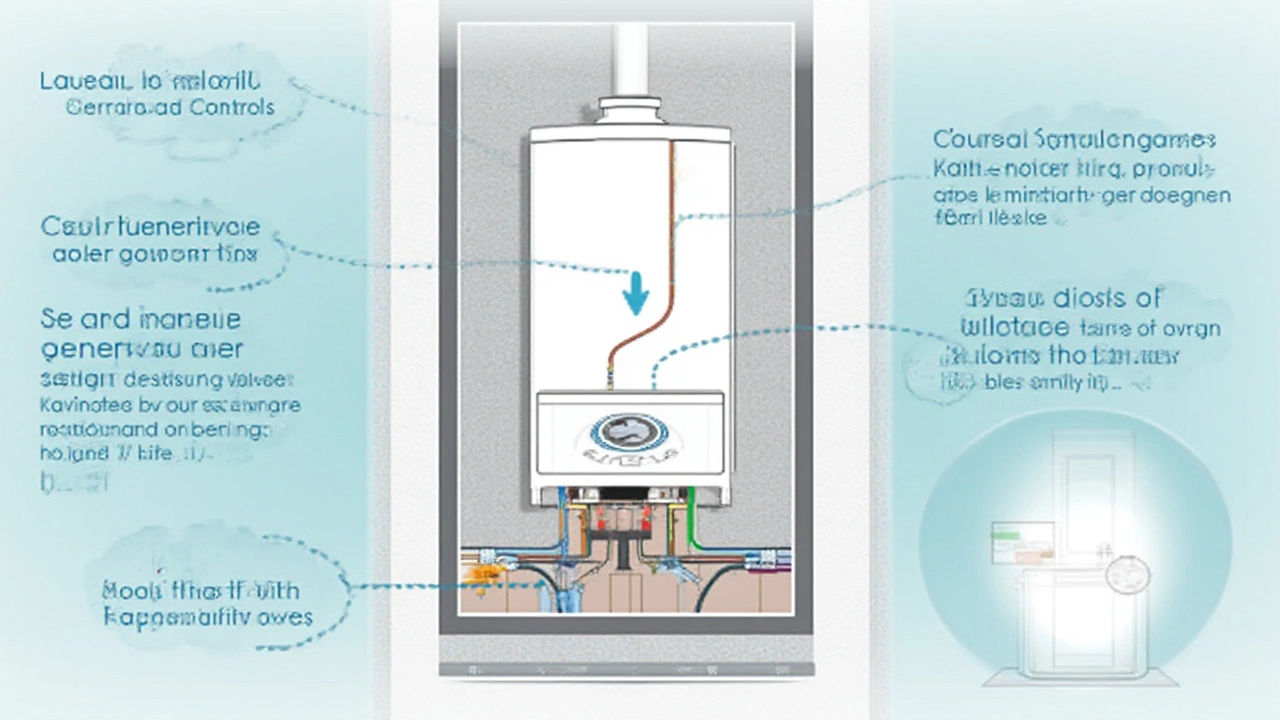Every winter, folks ask themselves the same thing: Am I messing up my boiler by flipping it on and off so much? Boilers are the unsung heroes of our homes, but that little voice in your head wondering if you’re accidentally wrecking an expensive bit of kit just by operating it how you want—yeah, that's real. Modern boilers are tough and built for cycles, but persistent on-off action might not be as harmless as you think. Let's open the hood on this hot topic and pick apart the myths from the facts so you can stay warm without regrets.
The Real Impact of Power Cycling on Boilers
Most boilers, whether they’re gas, oil, or electric, are made for repeated starts and stops—engineers call this power cycling. Your main worry here is the wear that happens each time it sparks up and winds down. Firing up the boiler puts every moving part into action, especially the ignition system, circulation pump, and safety controls. British Gas reports that the average household boiler handles 1,500 to 2,000 cycles a year. A well-serviced machine is fully ready for that. But here’s where things get interesting: the real stress comes during the warm-up period, when the metal parts rapidly heat up, expand a bit, and then cool down again later. That’s called thermal cycling, and it’s the main culprit for tiny cracks around heat exchangers over—think 5 to 10 years—if you’re switching it on and off all the time.
Quarterly stats from boiler manufacturers show that most top-brand modern boilers are tested for at least 50,000 start-stop cycles. Practically, even if you turn your boiler on and off each day through autumn and winter, you’ll never come close to maxing out that endurance. Still, if you’re using a really old system from the 1980s or even early 2000s, be gentle. Those machines deal with higher metal fatigue and wore out faster because they never expected daily cycling. Boilers also don’t like being forced to heat a freezing system from stone-cold every single time. It means your pump pushes more forcibly, the ignition is under more strain, and the chance of an ignition lockout ticks upward.
It’s not just about the parts inside, either. If your pipes are prone to freezing or if condensation inside the system can’t dry out, repeatedly shutting off the boiler can leave it vulnerable. Remember, when a boiler is off, it isn't protecting itself from cold. British weather can change fast, and a cold snap overnight could lead to burst pipes before you wake up. So, the verdict? No, normal switching isn’t going to wreck a quality, modern boiler—but constant and unnecessary flicking every hour won’t do it any favors over time.
How Boiler Cycling Affects Efficiency and Running Costs
Turning your boiler off when you leave the house and firing it up again as soon as you’re home sounds thrifty, right? The truth is a bit muddier. Every time the boiler starts from cold, it gulps a bit more gas or electricity compared to running at a steady, low pace. The jump from ice cold to steaming is what eats extra energy. According to data from the UK’s Energy Saving Trust, a house that leaves the heating on low all day usually spends less on energy than one cranking it up from zero twice a day—unless you’re leaving it blasting full-tilt in an empty house. Factory figures back it up: a typical combi boiler has a spike of up to 7% extra fuel use in the first 10 minutes after switching on from cold.
| Boiler Usage Pattern | Annual Fuel Usage Increase | Estimated System Wear |
|---|---|---|
| Turned Off at Night | +2% – 6% | Minimal for Newer Models |
| Constant On/Low Set | Baseline (Most Efficient) | Minimal Wear |
| Frequent Short On-Off Cycles | +6% – 12% | Increased Wear, Especially Ignition |
The real wallet killer isn't powering down for a holiday—it’s constant on-off cycling throughout the day either by a fussy owner or a poorly set thermostat. Each short cycle doesn’t let the system hit peak efficiency before shutting off again, and it never keeps your rooms comfortable for long. You end up with cold spots, and some digital thermostats will even overstress your boiler if set too tightly with narrow temperature swings.
If you want to curb costs, set your programmable thermostat for longer, steady intervals. Use your boiler’s built-in eco-mode (if it has one) which keeps things ticking gently without wasting energy. And if you’re heading out for days, switch it off entirely and bleed the radiators once you’re back—your boiler won’t mind a short break, and your wallet will breathe easier without heating an empty home.

Smart Tips to Maximize Boiler Life and Efficiency
Guaranteeing a long lifespan for your boiler isn’t just about how often you use the power button. Here’s the inside track—the stuff heating engineers wish homeowners would remember, but rarely say out loud. First, boilers crave a yearly checkup. Skipping a service is like never changing the oil in your car but hoping it’ll last. During a service, a pro looks for stress cracks, clears gunk off the heat exchanger, checks pressure, and reassures your boiler’s brain (the control panel) is sharp and snappy. Annual maintenance cuts the odds of surprise breakdowns by about 70%, based on insurance claims data.
- Program your thermostat for no more than 3-4 cycles a day for household comfort—cranking it much more means unnecessary stops and starts.
- If your boiler keeps switching itself on and off fast (short cycling), call an engineer. This usually means the system is oversized, the temperature sensors are faulty, or air is stuck somewhere it shouldn’t be.
- Insulate exposed water and gas pipes, especially if they run through garages or loft spaces. Not only does this save energy, it stops freezing in winter when the boiler sits off for a while.
- Use ‘holiday’ or ‘frost protection’ mode when you’re away rather than turning things off completely in freezing weather. Most new boilers fire up automatically to prevent frost even when technically switched off.
- Always check the pressure gauge before restarting a cold boiler. Too low, and it strains to circulate water. Too high, and valves start to leak.
If you’re shopping for a replacement, prioritize combi and condensing boilers with smart sensors and self-learning thermostats. They adapt to your habits, reduce cycling, and save money. And if your model is so old it’s got a pilot light instead of electronic ignition, you’re burning money for nothing. UK Building Regulations have banned non-condensing gas boilers in new installs since 2005, because they use up to 20% more fuel and fail earlier due to heat stress. Time for an upgrade if yours predates the iPhone.
Signs Your Boiler Is Suffering from Too Many On-Off Cycles
Think your boiler’s not enjoying your on-off relationship? Watch for these dead giveaways before you have to shell out for a new one. First red flag—strange noises. If you hear persistent clicking, tapping, or a sound like a kettle just before your boiler fires up, it’s often suffering from excess strain on its ignition parts. Prolonged cycling can loosen joints or wear out sensors inside. Next, look for pressure fluctuations. If you keep seeing the pressure gauge bounce up and drop down after each cycle, or you have to top up the pressure every few weeks, you’re probably overdoing it.
Short cycling, or the boiler switching off after just a few minutes on, is the classic symptom. This means the system is either too powerful for your home or the thermostat is calling for heat too quickly before it cools. Another sign: radiators that never get properly hot, leaving some rooms chilly while others boil. If your boiler takes a long time to actually ignite (it clicks or tries several times to light), that’s a clear hint the ignition system is being overworked—and these aren’t cheap to replace.
- turning boiler on and off several times daily can cut its expected lifespan by as much as 15% over a decade, especially for units older than 10 years.
- If your units are leaking from seals or valves, or the condensing pipe constantly drips even when off, call an engineer. Chronic cycling can loosen seals overtime, causing more leaks and corrosion worries.
- Energy bills creeping up without more hours of actual heat? Often, over-cycling means you’re burning gas on warm-ups but not getting much warmth back.
Rule of thumb—if you’re noticing any repeated issue after switching your boiler off for only a few hours, don’t ignore it. Sometimes it’s just a tweak or a new part, sometimes it’s a sign your system needs a different timer or thermostat. The best move if in doubt? Get a reputable engineer to inspect, because there’s no substitute for a professional eye when it comes to catching stress before it turns critical.

